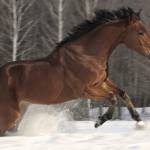Temperature Swings and Colic in Horses

As winter sets in and the climate changes, notable temperature swings have occurred in many areas of the country. Perhaps it’s 50○ F (25○ C) during the day but drops to 25○ F (-4○ C) at night, or sunny and mild one day but snowing the next. Horses are notorious for colicking under these conditions, but horse owners can minimize this through simple management strategies.
It may seem obvious, but providing access to fresh, unfrozen water is essential for proper hydration and digestion. The more forage a horse consumes, the more water required to help move it through the gastrointestinal tract. This is especially important in winter when moisture-rich pasture grass is limited or absent.
“Offering free-choice salt or adding a little salt or electrolytes to a horse’s ration will encourage a horse to drink and assist in keeping a horse adequately hydrated, minimizing colic risk,” suggested Kathleen Crandell, Ph.D., an equine nutritionist with Kentucky Equine Research (KER).
“Another key to helping a horse stay hydrated is to provide plenty of forage in the form of hay or pasture grasses because the presence of the fiber in the gut will stimulate the thirst response,” recommended Crandell.
Additionally, microbes in the hindgut ferment the structural carbohydrates, or fiber, in hay or grass. Heat is a byproduct of fermentation, which helps keep the horse warm. For this reason, extra hay (and water, of course) should be offered when temperatures are expected to drop. Note that grain concentrates will not have quite the same hydrating or warming effect. “Exceptions would be commercial feeds high in beet pulp or standalone soaked beet pulp, which will have a similar effect as forage,” added Crandell.
When temperatures drop, it’s not unusual for training regimens to diminish and for turnout time to decrease. Exercise and movement, even if just walking around a turnout area, promotes gut motility. When horses are confined for long periods due to inclement weather, the risk of colic increases. Keep horses moving and turned out as long as the footing is safe. With this in mind, for horses that live outside, shelter is critically important for protection from the elements. If a horse’s coat or blanket becomes wet, the risk for chill increases dramatically and could trigger a bout of colic. Be sure to check in on your horses, especially in inclement weather.
Don’t overlook basic, year-round management. Having teeth professionally floated when necessary, typically at least once a year, will ensure a horse can properly chew feed and forage. In addition, proper parasite control will help the horse maintain proper body condition and a healthy digestive tract.
Horse owners can help their horses by noticing changes in behavior and well-being. What constitutes normal behavior? What is your horse’s normal body temperature? Basic observations can reveal a lot, and a keen eye can detect subtle changes that may be indicative of an impending problem.
In summary, remember the basics. The importance of water cannot be overstated in helping a horse stay healthy and hydrated. Good-quality forage is essential for warmth and proper gut motility. When drastic temperature changes are predicted, pay extra attention to a horse’s behavior. Any subtle changes could indicate a problem. Call your veterinarian immediately if you suspect colic or any health issue.








